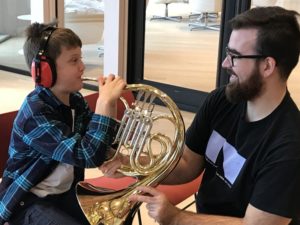 In recent years, there has been a tremendous increase in recognition of the need for access to the arts and music for the special needs community. Music is part of the human experience and all people have a right to be a part of that. Yet, traditional concert events have barriers that are difficult to overcome: bright lights, loud sounds, high cost, and the expectation of proper concert etiquette and behaviour can make attending orchestral concerts impossible for many with special needs. Arts education opportunities that are truly accessible are also few and far between. Physical accessibility is only part of the equation; true accessibility involves removing all barriers, which requires creative thinking on the part of arts organizations.
In recent years, there has been a tremendous increase in recognition of the need for access to the arts and music for the special needs community. Music is part of the human experience and all people have a right to be a part of that. Yet, traditional concert events have barriers that are difficult to overcome: bright lights, loud sounds, high cost, and the expectation of proper concert etiquette and behaviour can make attending orchestral concerts impossible for many with special needs. Arts education opportunities that are truly accessible are also few and far between. Physical accessibility is only part of the equation; true accessibility involves removing all barriers, which requires creative thinking on the part of arts organizations.
 The benefits of taking part in accessible music making and concerts goes beyond just the music (which is a great incentive in itself!). Participating in an accessible adapted music program can facilitate social skill development through encouraging turn taking and engaging with peers. The sensory stimulation provided by making and listening to music in a controlled environment can aid with self-regulation and promote well-being. For parents of children with special needs, the opportunity to engage with the arts in a way that is comfortable for their child is priceless.
The benefits of taking part in accessible music making and concerts goes beyond just the music (which is a great incentive in itself!). Participating in an accessible adapted music program can facilitate social skill development through encouraging turn taking and engaging with peers. The sensory stimulation provided by making and listening to music in a controlled environment can aid with self-regulation and promote well-being. For parents of children with special needs, the opportunity to engage with the arts in a way that is comfortable for their child is priceless.
The National Arts Centre in Ottawa has taken up this cause with dedication to creating a welcoming and adapted environment for the special needs community. Since 2012, the NAC has offered their groundbreaking Music Circle program. This hybrid music education and concert experience is designed to meet the needs of special needs patrons. Small groups participate in a series of hands-on workshops featuring an instrumental family (brass, woodwinds, strings or percussion), followed by a sensory-friendly concert featuring those same instruments. The environment is comfortable, with various seating options, space to move, and a quiet area for breaks as needed. The workshop material is developed to meet the needs of each participant and allow them to interact with the instruments and each other in a way that is comfortable and meaningful for them. The concert is carefully planned to prevent sensory overstimulation. For many, participation in this program has also served as a bridge to attending regular orchestral concerts, and the NAC has facilitated this by offering sensory-friendly pre-concert activities at family concerts. Through the Music Circle program, hundreds of patrons of all ages with special needs have come to learn about the orchestra and have attended concerts designed to meet their needs. As a result, a love of music has been sparked in many, and they feel welcomed and comfortable at the National Arts Centre.
Thank you to Erin Parkes from the Lotus Centre for Special Music Education for writing this guest blog. Erin will be at our national conference talking about orchestras and social inclusion with other experts in the field including Ian Ritchie (Setúbal Music Festival), Faith Scholfield (Windsor Symphony Orchestra), and Elizabeth Simpson (NAC Orchestra).
